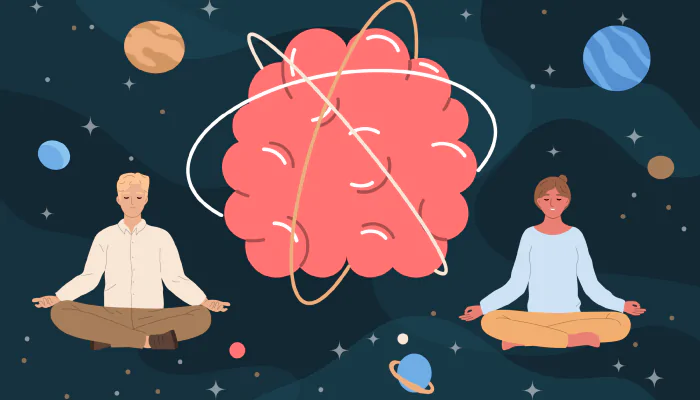Meditation is a practice to increase your cognitive connection with the present moment. Most of the time, our thoughts wander into past or future events. This is where meditation comes into existence, read on to discover how our brain react to meditation?
The mind wandering has 2 times, The first type is that our mind switches between multiple thoughts. In 2nd condition, we stick to one thought or event that we can’t get rid of. Are you thinking that meditation is going to stop your wandering through?
Well, the answer is Yes, and No. It wouldn’t stop your thoughts, but it will break your thought process, and kick back to the present. Read on to find out how the meditation rewires your brain.
Dr. Tracey Marks, doctor and psychiatrist. She explain “Meditation in right way help you to rewrite the your brain that eventually lead to express emotions in better way, and release stress”. Watch the video to understand in better way.
Research & Case Study
A research has been carried out in Columbia University Medical Center, the research discovered that meditation breaks that existing connection of multiple parts of your brain through relaxation. Relaxations gives you time to slowdown the thoughts and start connecting dots of puzzle. research claims that meditation leads to relief from stress, depression, and anxiety.
Meditation enhances your Focus
In our daily lives, our mind wander frequently, to control the mind wandering, a few meditation experts mention” Do meditation, your wandering thoughts will be done”. They are partially right because meditation doesn’t stop your thoughts, but rather meditation connects your thoughts. When you sit for meditation, your mind wanders as usual, which is completely normal.

Then you refocus your mind again and again to focus on breathing, which helps you to break the habit of mind wandering and focus on the present moment (breathing). After a few weeks, your mind’s focuses increase as you start paying attention to the present moment more frequently. If you don’t have time to go for meditation sessions, well, you can learn 1 or 2 meditation strategies from YouTube and start implementing them. You can even perform 10 minutes of meditation daily.
Meditation calms your mind
Dave Vago performed an experience with meditation practitioners from a few years to more than 20 years of experience meditation practitioners to find out the “real” rest state of mind. In the experience of FMRI experience, it has been deduced that meditation practitioners have trained their minds to let the thoughts run freely without any judgment after meditating over and over, our mind becomes aware of our thought patterns, and we feel peace of mind.
Meditation makes you creative

During meditation, our brain becomes habitual to getting our attention back to breathing again and again. Some people call mindfulness staying in the presence without judging oneself. But the actual meaning of mindfulness is to stay focused on one thing longer and in-depth. When you make your mind habitual, stay focused on one thing at a time, and then your mind tries to get different angles for the particular problem or task. This way, you not only perform the task, but you do it creatively and in a different way.
Meditation reduces your anxiety
When you feel anxious, your mind is mostly running into “what ifs” and future outcomes that haven’t even happened yet. Meditation doesn’t stop those anxious thoughts, but it gives your brain a way to observe them without reacting.

When you sit and meditate, even if your heart is racing or your thoughts are loud, you slowly learn to shift your attention to breathing. Over time, your brain starts responding differently to anxiety triggers. You may still feel anxious, but now you have a tool to deal with it—it doesn’t control you anymore, you control your response.
Meditation eases your depression
Depression often sticks your brain in a loop of sad memories or hopeless feelings that repeat again and again. Meditation doesn’t magically remove depression, but it helps your brain get a pause. Instead of diving deep into those dark thoughts, meditation trains your mind to notice them and come back to something neutral like your breath. This small act, again and again, can rewire the part of your brain that handles emotions. After weeks of practice, your brain becomes more flexible, and you begin to find short pockets of relief even on hard days.

Now you know how meditation doesn’t stop your thoughts but changes how your brain reacts to them, making you focused, calm, creative, and emotionally stronger. Whether it’s anxiety or depression, meditation helps you deal with them from a better space. So, tell me in the comments—have you ever tried meditation, and how did it change your mind?
How does the brain react to meditation?
Brain is formated to multiple neuronetworks, when you meditate on regular basis. Then your brain start connecting your random thoughts to format a networks, which eventually lead to relaxed and creative mind.
What are benefits of meditating on daily basis?
Meditating on daily basis form a habit of your brain to process the random thoughts, which eventually leads to stress, depression, anxiety free livestyle.
Does meditation enbale me to have more control on my brain?
Yes, research suggest that meditation allows you to have clear emotions at any suitation, and you have more control over your brain during tough and normal days.

